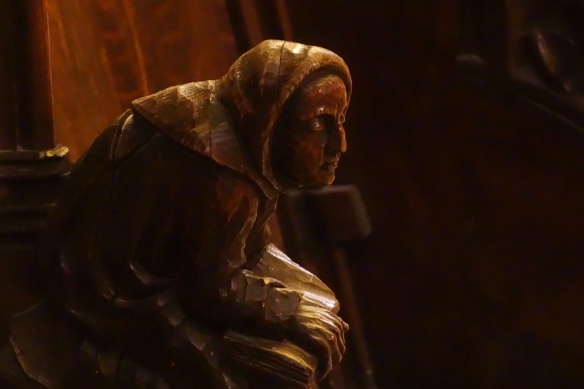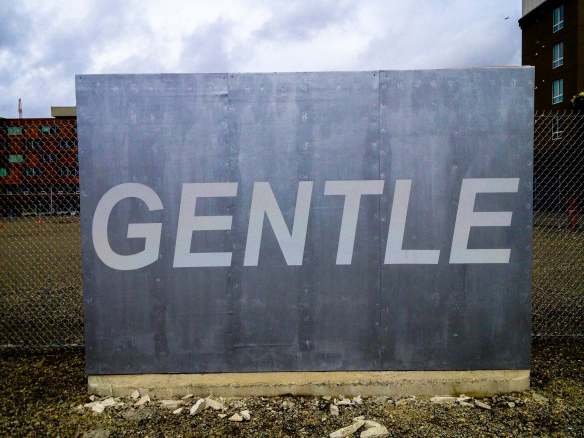
Bench carving, Cathedral of Seville, Spain
In the liturgical rite for Ash Wednesday, the priest stands up before the people and invites them “to the observance of a holy Lent.” It is a solemn and noble custom. But is it a serious proposal? And if so, what is actually being asked of the faithful?
When people hear the word “holy,” they often think “devout” or “virtuous,” but qodesh, the word for holiness in the Hebrew Bible, is not a moral or behavioral term. It means “apartness,” conveying an inherent, critical difference between what is holy and what is not.
The word itself is set apart. Unlike other divine attributes like power, justice and love, holiness has no analogue in the everyday life of Israel. It doesn’t refer to a common experience and then say God is like that. Instead, it evokes the one quality of God which is unlike anything we know.
In ancient Judaism, holiness meant the radical otherness of God, the Holy One. The divine presence is not to be approached easily or casually, either by our bodies or by our language. God dwells in a sacred zone which is highly charged, difficult and risky to enter.
Israel’s worship practices grew up around this strict sense of separation. At the center of cultic life was a holy of holies, a space set apart from contamination by the world. And only priests, who were themselves set apart and highly trained in the intricacies of access, were allowed to have contact with this sacred center. There was a sense that if the sphere of holiness were to be contaminated or carelessly regarded, the presence of the Holy One might withdraw from Israel, and that would be disastrous.
Leviticus, not a book I spend a lot of time with, contains a long section known as the Holiness Code because of its repeated use of holy and holiness, as well as related terms like sanctify, hallow, consecrate, dedicate, and sacred. It is filled with detailed prescriptions ranging from ritual practice to sexual behavior. Many of these seem archaic and largely inapplicable today. But may we still find something valid in the impulse to preserve the “holy” from profanation or inattention?
The sacred is made present by the attention we give to it. For example, if you come to a labyrinth occupying an open space, do you just walk straight across it, or do you go around it, acknowledging it as a space set apart for prayerful activity? Or does it only become holy space when it is put to its intended use, rather than just lying there as a decorative floor pattern?
I once led a weeklong family retreat for a Nevada parish on the eastern shore of Lake Tahoe. There was a beautiful stone church, with a large window looking across the water to the high peaks of the Sierra mountains. The space around the altar was large enough to hold all of us, so we did most of our worship there, in the intimacy of a circle.
I asked everyone to do two things each time they came inside the altar rails. One was to remove their shoes, like Moses at the Burning Bush. The other was to perform an action of their choice to mark their entrance into holy space: they could lift their hands in prayer, bow, genuflect, cross themselves, kiss the altar, or prostrate themselves on the floor. Most of the children, being the enthusiastically embodied creatures they are, opted for prostration! The effect of these physical observances was tangible. The attention we gave changed the quality of being there. It became for us holy ground.
But what Leviticus is after, and what a holy Lent is about, is more than the quality of a space or the attention we pay to it. Holiness is meant to be something contagious, something which gets inside us and changes us forever.
You shall be holy, for I your God am holy (Leviticus 19:2). God is not content to limit holiness to Godself. God’s people are invited to be holy as well. Not just our sanctuaries, but ourselves, are made to be set apart, consecrated, sanctified, hallowed. Biblical theologian Walter Brueggemann has called this the “obligation tradition,” where “the purpose of Israel’s life is to host the holiness of Yahweh.”[i]
As biblical people gradually figured out, hosting divine holiness means more than maintaining ritual purity or devotional piety. It means embodying justice and peace as well, uncontaminated by the dehumanizing, violent and oppressive practices of the dominant culture. Such holiness requires the consecration and dedication of every aspect of life to the will and purpose of God.
Leviticus 19:9-18 provides some excellent guidelines for our own time:
- Don’t keep all your food for yourselves
- Remember the poor and the immigrant
- Don’t steal, lie, or defraud one another
- Don’t exploit your workers
- Be mindful of those with special needs
- Be fair and just in your dealings with others
- Don’t slander, seek revenge, or carry grudges
- Love your neighbor as yourself
The nice thing about such a list is that these are all things we can do. They are not perfections only achievable in a messianic future. We can perform them right now. Jesus offered a similar list. Is somebody hungry? Feed them. Is anybody thirsty? Get them some water. And if curing the sick or setting the prisoner free seems beyond you, surely you can at least visit them. This is not impossible stuff.
Holiness, an attribute of God, becomes for us a practice.
Not something we are, but something we do.
Of course the specific obligations of holiness are not always clear. It is one thing to separate yourself by going to the desert, the monastery, or a countercultural refuge. It is quite another to live in contemporary society with its inevitable complicity in the evils by which the system maintains itself: militarism, consumerism, economic injustice and violence against the planet. How do we say no to the evil and yes to the good in a world of such complex interdependence?
And yet, Scripture remains insistent that we continue to strive for sanctification, dedicating our lives to God and separating ourselves from whatever is not of God.
- God chose us in Christ to be holy and blameless, full of love (Ephesians 1:4)
- Clothe yourselves with the new self, created according to the likeness of God in true righteousness and holiness (Ephesians 4:24)
- Surrender your bodies to righteousness in order to create a holy life (Romans 6:19)
Surrender. Is this too much to ask? Is a holy life too much to ask? Does it set the bar so high that we just abandon the field to an elite corps of ethical heroes: the few, the proud, the saints?
Even worse, does a religion of obligation veer us toward “works righteousness,” overestimating our powers and denying the need for grace? Well, even Calvin admitted the possibility of making progress in personal goodness. He echoed the purity language of Leviticus when he wrote:
Ever since the Holy Spirit dedicated us as temples to the Lord, we should make it our endeavor to show forth the glory of God, and guard against being profaned by the defilement of sin. Ever since our soul and body were destined to heavenly incorruptibility and an unfading crown, we should earnestly strive to keep them pure and uncorrupted against the day of the Lord.[ii]
But where do we begin? Thomas Aquinas outlined three stages of holiness: First, distance yourself from sin and wrong inclinations (holiness as an act of separation, turning your back on sin and turning toward God). Second, work on cultivating the virtues in your life (holiness as a daily practice). Finally, rest in loving union with God (holiness as communion with the Holy One).
This triptych of holiness is echoed in my favorite collect in the service of Morning Prayer:
- drive far from us all wrong desires (separation)
- incline our hearts to keep your law, and guide our feet into the way of peace (practice)
- that, having done your will with cheerfulness during the day, we may, when night comes, rejoice to give you thanks (communion)
Or to put this in the simplest terms:
- What do I need to let go of?
- What do I need to acquire and cultivate?
- In whose reality do I want to dwell?
It’s not about effort, of course. Sola fide, sola gratia, soli Deo. Only faith, only grace, only God. As Augustine knew, “When God crowns our merits, God crowns nothing but God’s own gifts.”[iii]
And it’s never done, this holiness business. It’s an open-ended process of continual striving. Gregory of Nyssa said, “The perfection of human nature consists perhaps in its very growth in goodness.”[iv] In other words, holiness isn’t something we achieve, it’s a commitment to growth.
And as an old eucharistic prayer suggests, the time to start is now:
And here we offer and present unto thee, O Lord,
our selves, our souls and bodies,
to be a reasonable, holy, and living sacrifice unto thee.[v]
What if, every day during Lent, each of us were to make such a prayer?
Here I offer and present to you, O God, my ________.
Just fill in the blank with whatever the time and place requires.
Related posts
Grace me guide
Heart work and heaven work
[i] Walter Brueggemann, Theology of the Old Testament: Testimony, Dispute, Advocacy (Minneapolis: Fortress Press, 1997), 428
[ii] John Calvin, Institutes 3.6.3
[iii] Augustine, Epistle 154, 5.16
[iv] Gregory of Nyssa, Life of Moses 10
[v] Thomas Cranmer, Book of Common Prayer (1549), based on Romans 12:1, in the Episcopal Book of Common Prayer (1979), 336.








